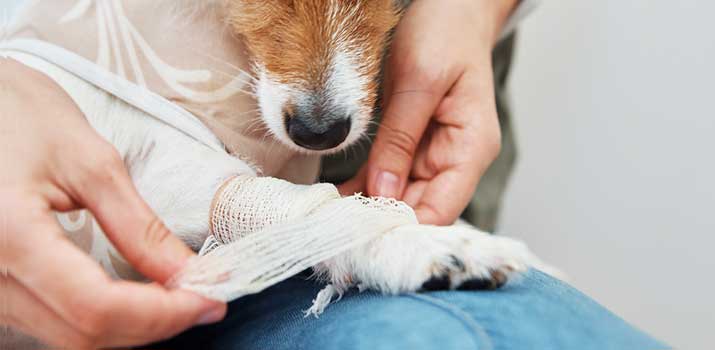Whether you have a rambunctious Golden Retriever or a posh little Pomeranian, your pup is prone to injuries. Accidents happen! Canines are curious and playful creatures that love to get themselves into trouble.

Your dog can get a small scratch from playing in the backyard or even injure themselves accidentally while self-grooming. Whatever the case, you need to understand basic dog wound care.
Of course, serious injuries require veterinary attention. If your dog is in clear pain, acting strangely, or bleeding excessively, it’s best to go to your vet for care. But for those minor cuts and scrapes, you can treat wounds at home.
Antiseptic is one of the most important things to have on hand for dog wound care.
There’s no shortage of artificial antiseptics on the market; you can even find products made exclusively for dogs. But those commercial antiseptics may contain ingredients your dog doesn’t agree with.
That’s why many dog owners prefer to use natural alternatives.
Natural antiseptics get the job done safely and are a great option for pups with sensitive skin.
Antiseptic and Dog Wound Care
Before we go over some great natural antiseptics for dogs, let’s review the basics.
While many people use “antiseptic” and “antibacterial” interchangeably, they are not the same. Antibacterial products actively destroy bacteria.
Typically, you use them when an infection is already causing issues. However, antiseptics are more of a preventative measure.
An antiseptic substance cleans wounds and prevents microorganisms from growing. They can protect wounds from viruses, bacteria, and more.
The great thing about antiseptics is that they cover all your bases. You can use them on most superficial wounds, whether there’s a risk of infection or not.
You can use them when you don’t know much about the wound, but it’s not serious enough to warrant a trip to the vet.
The Best Natural Antiseptic for Dog Wounds
Commercial antiseptic solutions often have chemicals that could irritate your dog’s skin. While they prevent bacterial growth, they cause more headaches than they solve.
Fortunately, natural alternatives are just as effective. They lack potentially dangerous chemicals and are safe for most dogs.
Here’s a list of some of the best natural antiseptics you can use for dog wound care.
Vinegar and Water

If you use vinegar for cleaning, you know how effectively it can control bacteria. Before the days of chemical cleaners, people used vinegar for everything from wound care to sanitization. It’s a great natural alternative that’s cheap, easy to get, and safe.
The best type of vinegar to use is apple cider vinegar. Made from fermented apple juice, this vinegar has both antiseptic and antibacterial properties. It soothes the skin, too.
Apple cider vinegar is perfect for dogs with sensitive skin for everything from hotspots to superficial cuts. You can also use standard white vinegar if you have a dog with white fur.
While not as beneficial as apple cider, it’s an acidic solution with great antiseptic properties. Plus, it won’t discolor your dog’s fur!
Mix one part vinegar with three parts water to make your vinegar solution. Transfer the solution to a spray bottle, shake it well, and apply it to the wound.
Be warned: The vinegar solution may sting a little. So, provide a treat to reward your brave pup afterward!
Aloe Vera
Aloe vera is the ultimate natural remedy. Many consider it a miracle plant!
Aloe vera plants are a type of succulent. They’re easy to grow at home, so it’s a good idea to get a plant always to have a natural antiseptic for dog wounds.
Commercially grown aloe vera is also available, and you can find many aloe creams. If you go that route, make sure you’re getting pure aloe vera gel with no additives.
To use an aloe vera plant, you’ll need to harvest the gel inside. These plants are thick and contain a clear gel.
After snipping off a leaf, cut off the green outpart. You want clear gel. If it’s yellow or discolored, don’t use it on your dog.
Rub the gel onto the wound, and your pup is good to go. Aloe vera gel has antimicrobial and anti-inflammatory properties. It’s also moisturizing and works well to address skin problems.
Turmeric

Who would have thought spices in your kitchen cabinets could act as a natural antiseptic?
Turmeric is a popular spice used in cuisines around the world. It’s a deep orange spice with a rich flavor. It comes from a flowering plant, but the spice doesn’t come from the leaves or flowers.
It’s harvested from the roots and is in the same family of plants as ginger.
Like aloe vera, turmeric has a long history of medicinal use. It’s known to help with digestive issues, liver problems, and more. When applied topically, it can even heal acne and soothe skin.
For dog wound care, turmeric promotes healing and reduces swelling. It’s also antibacterial.
There are many ways to use turmeric. If the spice is all you have, you can create a paste mixture with water. However, the best way to utilize the spice is to mix it with aloe vera gel.
Combine one part turmeric with one part aloe before applying the gel to the wound.
Coconut Oil
Next up, we have coconut oil. This is another substance that has many purposes. Many use it as part of their skincare routine and for dental hygiene. It’s also great for your hair and skin. You can even use it in your cooking!
What makes coconut a good antiseptic? It consists of 90 percent natural fats. Coconut oil also has lauric acid. The acid is what cleans the wound and prevents infection.
Coconut oil is easy to use, and it works fast! All you have to do is rub the coconut oil into the wound and wait for it to absorb. After about five minutes, you can wipe away any excess.
Many dogs love the taste of coconut oil, so be wary about your dog licking it up. It’s also a good idea to consult your vet before using coconut oil if your pup is prone to weight gain.
Herbal Tea

Herbal teas come with countless health benefits, but you don’t have to consume them. Teas can include a variety of medicinal herbs. Popular concoctions include lavender leaves, chamomile, and calendula.
Combine the leaves and steep them in boiling water. Generally, it’s best to steep about two tablespoons of herbs with one cup of water.
Cover the tea and allow it to cool to room temperature. Then, you can strain the leaves, put the tea in a spray bottle, and store it in the refrigerator.
Herbal tea relieves irritation. It addresses inflammation and can promote healing. As an antiseptic, it’s safe and reduces the risk of infection. Apply the tea to the wound several times daily for the best results.
Silver Spray
Here’s a natural antiseptic that you can easily buy in stores. Silver spray, also known as colloidal silver, is a product many people use instead of hydrogen peroxide. But what is it?
Silver spray consists of microscopic silver flakes. It’s usually suspended in demineralized water.
Most people don’t realize this, but silver is a powerful antiseptic and antibacterial agent. Because silver spray contains microscopic silver, it can effectively attack and destroy bacteria.
To use silver spray, spritz it onto the wound. It’s as easy as that. There’s no need to rub it in. The silver will work its magic!
Witch Hazel
Witch hazel is another popular medicinal product from days past. Even today, you can get witch hazel in stores. Many skincare and wound care products contain witch hazel.
The clear liquid comes from the leaf, bark, and leaves of the witch hazel plant. It’s a type of astringent that people often use on their skin.
However, it’s a powerful antiseptic because the astringent sucks up moisture. It can effectively reduce inflammation and is a great choice for treating insect bites or stings.
Witch hazel can cause mild irritation if your pup is prone to dry skin, so be wary of using it too much.
When applying it to a wound, use a paper towel. You want to apply it to the wound without saturating the skin.
Lavender Essential Oils

Last but not least, there’s lavender essential oil. Lavender has many medicinal properties. It also smells great and soothes the skin. You’ll find the oil in many skin products, including soaps.
Lavender essential oil is a powerful antiseptic. It’s also antibacterial, anti-inflammatory, antimicrobial, and antifungal!
To use lavender essential oil, you need to dilute it. Add a few drops of the oil to a spray bottle full of water. Shake the mixture well before spraying it onto the wound.
Final Thoughts
Treating wounds doesn’t have to be complicated. Natural antiseptics can prevent infection and promote healing without chemicals.
Whether or not your dog has sensitive skin, using natural antiseptics for dog wounds ensures that those minor cuts and scrapes are not an issue for your canine companion!
Also Read:

